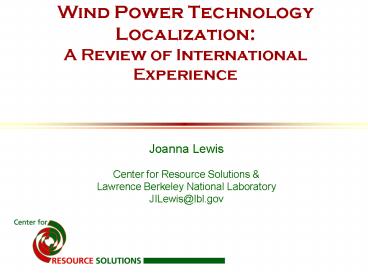Wind Power Technology Localization: A Review of International Experience - PowerPoint PPT Presentation
1 / 20
Title:
Wind Power Technology Localization: A Review of International Experience
Description:
a sizable and stable market for wind power. How big a ... Successful Policies Leading to Sizable, Stable Markets. Feed-in tariffs. Germany, Denmark, Spain ... – PowerPoint PPT presentation
Number of Views:157
Avg rating:3.0/5.0
Title: Wind Power Technology Localization: A Review of International Experience
1
Wind Power Technology Localization A Review of
International Experience
Joanna Lewis Center for Resource Solutions
Lawrence Berkeley National Laboratory JILewis_at_lb
l.gov
2
Outline of Presentation
- What is Localization?
- Possible Advantages of Localization
- Barriers to Localization
- Leading Manufacturers Local Situations
- Policy Mechanisms
- Conclusions
3
What is Localization?
- Developing a locally-based wind turbine industry
consisting of - Full turbine and component manufacturing
- Technology transfer, innovation, combination
- Specialization in components
- Technology transfer, innovation, combination
- Integration of components made by other companies
to particular specifications - May require no technology transfer or
locally-based innovation
4
Possible Advantages of Localization
- Technology cost reductions
- Domestic economic development jobs
- Export to international markets
- National achievement
5
Technology Cost Reductions
- Materials
- Advanced tower design
- Labor
- Rotor blades
- Transport
- Shipping freight costs
- Productivity improvements
Sources Krohn 1998, AWEA, EWEA, CANWEA.
6
Jobs in the Wind Industry
Source Paul Gipe 2004, see also EWEA 2003.
7
Barriers to Localization
- Existing international competition
- Technology quickly advancing
- Limited indigenous technical capacity
- Requiring use of technology that cannot be made
locally
8
The key to successful local wind technology
industry development?
- a sizable and stable market for wind power
- How big a market?
- How to establish stability?
9
Examples of Sizable Stable Markets
10
Percent of Installed Turbines Made by a Domestic
Company (2003)
Source BTM Consulting, 2004.
11
How Big is Big Enough?
Source BTM Consulting, 2004 IEA 2004.
12
Successful Policies Leading to Sizable, Stable
Markets
- Feed-in tariffs
- Germany, Denmark, Spain
- Mandatory targets (RPS, MMS, RO)
- US States, Japan, UK, Italy, Australia
- Tax credits/rebates
- US, India, France, Netherlands, Sweden
- Government bidding/concessions
- UK, China, France, Ireland
13
Policies that Specifically Support Localization
- Local content requirements
- Trade tariffs (customs duties)
- Tax policies export credit assistance
- Certification testing programs
- Research development (RD) funding
14
Local Content Requirements
- Spain
- Limited licensing policy to encourage regional
development - Canada
- Provincially-imposed local content requirements
- China
- Local content requirements imposed on concession
projects
15
Trade Tariffs
- Placed on whole machines or components, with
different results - WTO implications?
16
Tax Policies Export Credit
- Tax policies
- Local companies
- Foreign companies and JVs (China, India)
- Export credit assistance
- To support international sales (Denmark, Germany)
17
Certification Testing
- Builds confidence in product
- Internationally recognizable
- Helps quality control
- Leaders Denmark, Germany, India
18
RD Funding
- Sustained public support important
- Demonstration ? commercialization
- Many studies on key RD agendas for wind
19
Conclusions
- Must clarify national goals with respect to
localization - Leading global wind manufacturers come from
countries with substantial government policy
support for wind - Direct support for local manufacturing can be
used to meet domestic goals for the industry
20
Contact Information
- Joanna Lewis
- JILewis_at_lbl.gov
- USA 510-486-6828
- ??1368-327-4757
- Ryan Wiser
- RHWiser_at_lbl.gov
- Jan Hamrin
- JHamrin_at_resource-solutions.org































